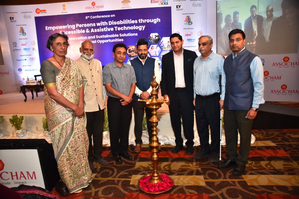New Delhi: The sixth conference on ‘Empowering Persons with Disabilities through Accessible and Assistive Technology’ was organised by ASSOCHAM.
With the theme this year being ‘Innovation and Sustainable Solutions for Equal Opportunities’, the conference highlighted the importance of accessible information and communication technologies (ICTs), physical infrastructure and transportation, promoting employment opportunities through policy interventions, the role of public and private partnership in ensuring access to quality and affordable assistive technology.
Assistive technology has taken on a whole new dimension — giving voice to the previously voiceless, hearing to the deaf, and greater mobility than previously available. Empowering persons with disabilities (PwDs) with the confidence to achieve seemingly impossible goals, assistive technology has provided them with devices to excel at workplaces and prove their mettle.
Artificial Intelligence is also playing a catalytic role by boosting the number of features available by augmenting assistive devices; capabilities and personalising experiences.
Anil Rajput, Chairperson of the ASSOCHAM National CSR Council, said: “According to the WHO, 16 per cent of the world’s population, which is over a billion people, have some form of disability, and 80 per cent of these live in the developing countries. With mobility being a critical factor in the lives of PwDs, in this context, I appeal to the automobile manufacturers in India to bring in the latest technologies in vehicles for disabled people that are being used in different parts of the world. This could have a transformational impact in the lives of persons with disabilities in India.”
“I also urge the media to not only focus on the challenges faced by the PwDs but also showcase their success stories. This will inspire many more to excel as well as bring forth their unique abilities before the larger audience,” he added.
According to estimates, the number of disabled persons in India stands at over 4 crore with some reports putting the number between 6 and 8 crore. Thus, ensuring an inclusive environment for PwDs will require concerted efforts of government, corporate houses and non-government organisations.
Rajesh Agarwal, IAS, Secretary, Department of Empowerment of Persons with Disabilities, Ministry of Social Justice and Empowerment, said: “Every fourth family has a child with a disability and although society is becoming more inclusive, we need to do a lot more to ensure inclusivity. Although the government has policies in place for providing employment opportunities to PwDs, I believe employment opportunities in large numbers will have to come from the private sector. We also need more special schools in the country.”
“Education is important as it will help them become independent and ensure their all-round development. Use of devices like braille displays, speech-to-text software, specialised keyboards, and software solutions have also emboldened PwDs and made them exemplary professionals,” he further said.
–IANS


Comments are closed.